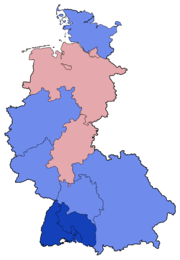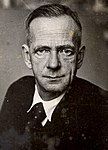German federal election, 1949
|
|
|||||||||||||||||||||||||||||||||||||||||||||||||||||||||
|---|---|---|---|---|---|---|---|---|---|---|---|---|---|---|---|---|---|---|---|---|---|---|---|---|---|---|---|---|---|---|---|---|---|---|---|---|---|---|---|---|---|---|---|---|---|---|---|---|---|---|---|---|---|---|---|---|---|
|
|||||||||||||||||||||||||||||||||||||||||||||||||||||||||
|
All 402 seats in the Bundestag, as well as 8 nonvoting delegates elected by the West Berlin Legislature 206 seats needed for a majority |
|||||||||||||||||||||||||||||||||||||||||||||||||||||||||
| Turnout | 78.5% (voting eligible) | ||||||||||||||||||||||||||||||||||||||||||||||||||||||||
|
|||||||||||||||||||||||||||||||||||||||||||||||||||||||||

|
|||||||||||||||||||||||||||||||||||||||||||||||||||||||||
|
|||||||||||||||||||||||||||||||||||||||||||||||||||||||||
Lutz Graf Schwerin von Krosigk
(Leading Minister until 23 May 1945)
Federal elections were held in West Germany on 14 August 1949 to elect the first Bundestag, with a further eight seats elected in West Berlin between 1949 and January 1952 and another eleven between February 1952 and 1953. They were the first contested elections since 1933 and the first after the division of the country.
After World War II, the German Instrument of Surrender and the country's division into four Allied occupation zones, the elections were held in the Federal Republic of Germany, established under occupation statute in the three Western zones with the proclamation of its Basic Law by the Parlamentarischer Rat assembly of the West German states on 23 May 1949. Most West German parties at the time of the 1949 Bundestag election were committed to democracy, but they disagreed on what kind of democracy West Germany should become.
The Christian Democratic (CDU) leader, 73-year-old Konrad Adenauer, former mayor of Cologne and party chairman in the British Zone since March 1946, believed in moderate, non-denominational and humanist Christian democracy (see, for example, Dennis L. Bark and David R. Gress, A History of West Germany, volume 1: 1945–1963: From Shadow to Substance, London, UK: Basil Blackwell, 1989; Erling Bjöl, Grimberg's History of the Nations, volume 23: The Rich West, "The Giant Dwarf: West Germany," Helsinki: WSOY, 1985), social market economy and integration with the West. In 1948 he had become president of the Parlamentarischer Rat, an office that added to his popularity as protagonist of a "state-to-be".
...
Wikipedia



